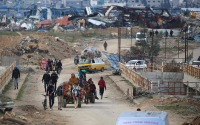by Roger CohenFebruary 13, 2008
NEW YORK: Europe will get a new state, Kosovo, on Sunday and the long, bloody unraveling of Yugoslavia will be concluded 17 years after the first war of its dissolution broke out in Slovenia. That is cause for celebration.
I say celebration although Serbia will rail against what its prime minister calls "this fictitious state on Serbian territory," and the Russian bear will growl, and Balkan tensions will flare for a while, and lawyers will fret over precedent.
The fact is the independence of Kosovo is justified, unique and unavoidable. There is no other way. Serbia lost a nationalist gamble on Kosovo a long time ago; the differences stemming from it are unbridgeable. Further delay of the inescapable can only damage the region.
So, come Sunday, I am reliably told, Kosovo will proclaim independence and early next week major powers - including the United States, France, Britain and Germany - will recognize the new state.
European Union foreign ministers meet Monday and may agree on a "platform" statement saying conditions for recognition have been met. A clear majority of the 27 European Union members - certainly no less than 20 - are expected to recognize Kosovo rapidly.Today in OpinionPutin strengthens his legacyUnnecessary damage to America's imageGates, NATO and Afghanistan
Cyprus, with its Turkish-occupied northern third, will lead the holdouts. Other EU states that are recognition-reluctant, some out of concern over separatist minorities, include Spain, Romania, Slovakia, Greece and Bulgaria.
Unanimity would be nice but broad consensus is sufficient. Thanks largely to the work of Wolfgang Ischinger, the German ambassador to Britain, the EU will be united enough. More important, the United States and Europe will march in step, not a frequent occurrence of late.
"This has been a common endeavor illustrating the way we and Europe ought to work together," said Frank Wisner, the former U.S. ambassador to India who labored fruitlessly with Ischinger last year to bring Kosovo and Serbia closer. Wisner's view: "There was never an attempt by anyone in Belgrade to reach out to a Kosovar Albanian."
Reaching out to Kosovo had scarcely been the Serbian thing in recent decades. Slobodan Milosevic, the late dictator, set Serbia's murderous nationalist tide in motion on April 24, 1987, when he went to Kosovo to declare that Serbian "ancestors would be defiled" if ethnic Albanians had their way.
Milosevic's quashing of Kosovo's autonomy was central to his conversion of Yugoslavia into "Serboslavia." The revolt against his bullying brought independence to former Yugoslav republics from Croatia to Macedonia. Serbs will kick and scream, but Kosovo is just the last piece of a dead state to go its inevitable way.
Albanians accounting for about 95 percent of a Kosovo population of 2.1 million cannot be reconciled with a Serbia that suppressed, beat up, evicted and killed them until NATO's 1999 intervention. Belgrade is no Berne: a Pristina inside Serbia would always be Pariahville.
But, Serbs protest in their blind pursuit of an untenable moral equivalency, the Kosovo Liberation Army were no kittens. Nor, once the Serbian genocide against Bosnian Muslims of April to September 1992 was completed, was the emergent Bosnian army. That's right: Persecute a people with enough savagery and they will in the end unite, rise up, fight and go their own way.
What will Serbia do now? Vojislav Kostunica, the nationalist Prime Minister, says he won't allow "such a creation to exist for a minute."
That's been the nihilistic Serbian drumbeat ever since United Nations Resolution 1244 of 1999 made clear that a UN-overseen and NATO-protected autonomy in Kosovo would extend only until "a final settlement." Belgrade never wanted to settle.
I expect Serbia to make modest trouble but stop short of violence and cutting off Kosovo's electricity. Some of the 120,000 Serbs in Kosovo may hit the road. Serbs in the pocket north of Mitrovica may be encouraged to go for partition.
But the recent election of a pro-Western Serbian president, Boris Tadic, will be a force for restraint. So will U.S. and European pressure on Albanians. Kosovo's Prime Minister, Hashim Thaci, has been making gestures to Serbs: that's positive.
Russia will call an emergency UN Security Council meeting. It will scream. But it's backed the wrong horse. Europe is right to demonstrate it will not cave to Moscow's pressure. Ultimately, Serbia will want to move toward EU membership.
Kosovo is not Transdniestria or Abkhazia or South Ossetia. It is an anachronistic remnant of a now defunct country, Yugoslavia, a province that has been under UN administration for eight years pending a final settlement impossible within Serbia. Milosevic rolled the dice of genocidal nationalism and lost.
In the long run, I believe this outcome will be positive for Serbia. Instead of dwelling on medieval battles, victory-in-defeat symbolism, shrinking borders and a poisonous culture of victimization, Serbia will begin to see what it wrought and look forward - to the West rather than the East.






